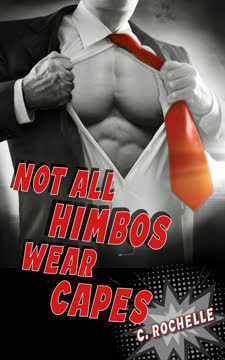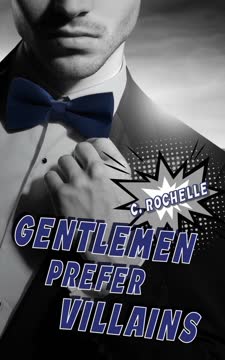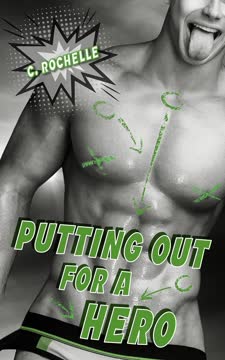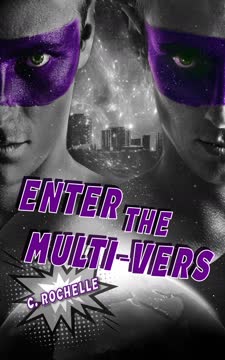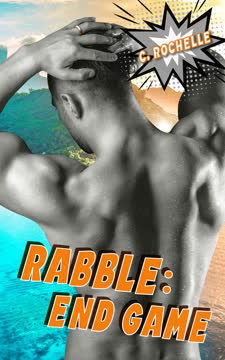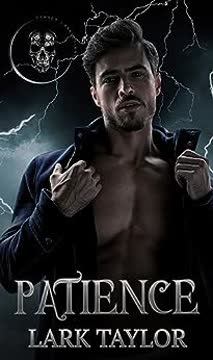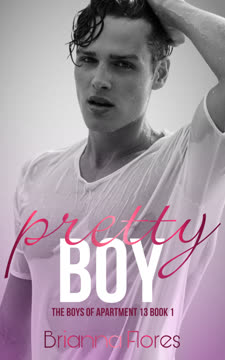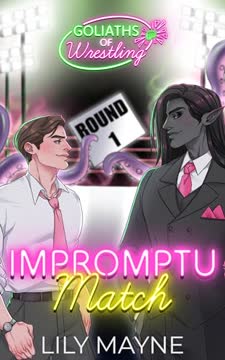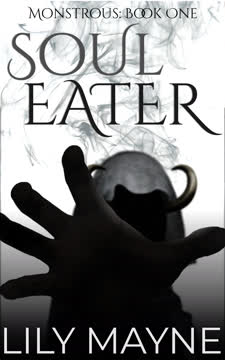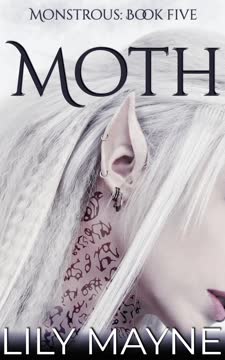Plot Summary
Villainous Obsessions Ignite
Xander, a brilliant but jaded villain, seethes as he watches Captain Masculine—Big City's golden superhero—receive yet another medal for "saving the day." Beneath his sarcasm and villainous bravado, Xander is consumed by a mutual, almost psychotic obsession with his heroic nemesis. Their cat-and-mouse game is as much about lust as it is about rivalry, with Xander's mind drifting to fantasies of Lycra, power, and domination. The city's narrative paints Xander as the villain, but his own life is a mess of family expectations, failed experiments, and a longing for connection. The stage is set for a collision between hero and villain, where the lines between hate and desire are already dangerously thin.
Swiping Right on Fate
After a disastrous day, Xander's best friend Kai creates a dating profile for him, leading to a match with Butch—a big, blond, seemingly simple finance guy. Butch, secretly Captain Masculine, is drawn to Xander's wit and edge, even as he questions his own sexuality and the expectations placed on him as a superhero. Their online banter is electric, quickly escalating from playful to filthy, revealing Butch's submissive desires and Xander's dominant streak. Both men are unaware of each other's true identities, but their connection is instant and intense, setting them on a path neither could have predicted.
Family Ties, Deadly Lies
Xander's family—infamous supervillains—demand his involvement in their criminal dealings, reminding him of his expendability and lack of powers. Meanwhile, Butch's life is equally suffocating: the son of legendary heroes, he's bound by contracts and expectations, forced into a role he never chose. Both men are haunted by family legacies, manipulative parents, and the threat of arranged marriages. Their respective clans see them as tools or bargaining chips, not individuals. The weight of bloodlines and the lies they're forced to tell threaten to crush any hope of autonomy or happiness.
Fried Chicken and First Dates
Their first date at a greasy diner is a revelation. Xander is instantly taken with Butch's eagerness to please and his hidden submissive streak, while Butch is overwhelmed by Xander's confidence and sexual dominance. The chemistry is undeniable, and their banter quickly turns into a power exchange that leaves both men reeling. Xander recognizes Butch's need for praise and control, while Butch finds himself craving Xander's approval and touch. The night ends with explosive, boundary-pushing sex, but also a sense of vulnerability and the first stirrings of something deeper.
Submissive Awakenings
Butch's sexual awakening is as much about trust as it is about pleasure. Xander guides him through new experiences, always emphasizing consent and communication. For Butch, who has never been given a choice in any aspect of his life, this is transformative. Their dynamic is raw and filthy, but also deeply caring—Xander's praise becomes Butch's lifeline, and Butch's submission awakens a protective, possessive side in Xander. Their connection deepens, blurring the lines between sex, love, and power, even as secrets still loom between them.
Masks, Secrets, and Shame
Both men struggle with the masks they wear—literal and figurative. Xander hides his villainy and lack of powers from the world, while Butch conceals his superhero identity and the pain of his family's control. Their growing intimacy makes these secrets harder to bear, and the shame of their double lives threatens to unravel everything. Xander's empathy and Butch's vulnerability draw them closer, but the fear of rejection and exposure keeps them from fully opening up. The tension between who they are and who they pretend to be becomes unbearable.
The Hero's Hidden Pain
Butch's life as Captain Masculine is a gilded cage. He's celebrated as a savior, but inside he's lonely, exhausted, and traumatized by the violence he's forced to enact. The city's adoration means nothing when he's treated as property by Biggs Enterprises and his own family. Xander becomes his only refuge, the one person who sees and cares for the man beneath the mask. Butch's need for Xander's dominance and care is a rebellion against the control and neglect he's always known. Their relationship becomes a lifeline, but also a source of new fears as the stakes rise.
Lust, Power, and Betrayal
Their sexual connection intensifies, with Xander introducing Butch to new kinks and pushing the boundaries of pleasure and pain. Butch's trust in Xander grows, but so does his fear of what will happen when their secrets are revealed. Meanwhile, Xander's family and Butch's employers close in, each with their own agendas. The threat of betrayal hangs over them, as both men are forced to choose between loyalty to their bloodlines and the love they're building together. The tension between lust and trust, power and vulnerability, reaches a breaking point.
Unmasking the Enemy
A series of confrontations and near-misses lead to the explosive revelation of their true identities: Xander is Doctor Antihero, and Butch is Captain Masculine. The shock is devastating—Xander believes Butch is dead, and Butch is consumed by guilt and shame for the violence he's committed. Both men are forced to confront the reality of their actions and the lies they've told. The pain of betrayal is matched only by the depth of their love, and the question becomes whether they can forgive each other—and themselves.
Inventus: Fated and Forbidden
The truth of their bond is revealed: Xander and Butch are inventus—fated mates whose powers amplify each other, making them nearly unstoppable. This connection is both a blessing and a curse, as it makes them targets for their families and the city's power brokers. The inventus bond is rare and feared, often destroyed before it can fully form. Butch and Xander must decide whether to embrace their fate and fight for their love, or succumb to the forces determined to tear them apart.
Contracts, Chains, and Rebellion
With the help of unlikely allies—including Xander's brother Wolfgang and the USN's Sylvano Ricci—they uncover the truth about the contracts binding heroes to human masters and the political machinations that keep heroes and villains divided. Butch's family tries to force him into an arranged marriage, while Xander's family seeks to use him as a weapon. Together, they rebel against these chains, exposing the corruption at the heart of Biggs Enterprises and the lies that have shaped their world. Their love becomes an act of defiance, a challenge to the system itself.
Bloodlines and Broken Bonds
The final battles with their families are brutal and costly. Betrayals are revealed, old scores are settled, and blood is spilled on both sides. Xander and Butch are forced to confront the legacies of violence and control that have defined their lives, choosing to break the cycle rather than perpetuate it. The deaths of key family members—heroes and villains alike—leave a power vacuum, but also the possibility of a new beginning. In the aftermath, Xander and Butch claim their right to define their own family and future.
The Ravine Reckoning
The climactic confrontation takes place at Dead Man's Ravine, where Vortexio kidnaps Kai to force Butch's hand. Xander and Butch, now fully bonded and sharing their powers, face off against Vortexio and Glacial Girl in a battle that tests the limits of their strength and love. Sacrifices are made, and the old order is destroyed in a storm of ice, fire, and wind. In the end, it is their connection—their willingness to fight for each other—that allows them to survive and triumph.
Aftermath and Anarchy
With the truth of their relationship and identities revealed to the world, Xander and Butch become symbols of change. They navigate the fallout from the battles, the media frenzy, and the shifting power dynamics in Big City. Butch is freed from his contract, Xander's villainy is redefined, and together they help reshape the city's approach to heroes, villains, and the people caught in between. Their love, once forbidden, becomes a beacon for others seeking freedom and authenticity.
Love in the Lair
Settling into a new life together, Xander and Butch create a home filled with love, laughter, and kink. Kai becomes their chosen family, and the possibility of children—once unthinkable—becomes a real dream. They support each other's healing, pursue their passions, and continue to challenge the world's expectations. Their relationship is a testament to the power of vulnerability, trust, and mutual care, proving that even the most broken can find wholeness in love.
New Rules, New World
In the aftermath, Xander and Butch work with allies to change the laws and culture of Big City, advocating for equality between heroes and villains, and the right to love freely. They become leaders in a new movement, using their story to inspire others to break free from oppressive systems. The world they help create is imperfect, but filled with hope—a place where love, in all its messy, kinky, and complicated forms, is celebrated. Their journey ends not with a happily ever after, but with the promise of new adventures, together.
Characters
Xander (Doctor Antihero)
Xander is the black sheep of the infamous Suarez supervillain family, marked by his lack of traditional powers but blessed with a brilliant mind and a biting wit. His villainy is more a product of circumstance than choice, and beneath his sarcastic, dominant exterior lies a deep well of loneliness and longing for connection. Xander's relationship with his family is fraught—he's both expendable and essential, used for his inventions but never truly accepted. His obsession with Captain Masculine is equal parts rivalry and lust, masking a desperate need to be seen and loved. Through his relationship with Butch, Xander discovers his own capacity for care, vulnerability, and heroism, ultimately embracing his inventus bond and fighting for a future on his own terms.
Butch (Captain Masculine)
Butch is the city's beloved superhero, the product of a legendary heroic bloodline and a lifetime of training, contracts, and expectations. Outwardly, he's the perfect himbo—big, strong, and endlessly obliging—but inside he's suffocating under the weight of his family's control and the violence he's forced to enact. Butch's submissive desires and need for praise are a rebellion against the neglect and manipulation he's always known. His relationship with Xander is transformative, awakening his sexuality, agency, and capacity for rebellion. As he embraces his inventus bond, Butch finds the strength to break free from his chains, redefine heroism, and choose love over duty.
Kai
Kai is Xander's neighbor, confidante, and self-proclaimed bestie, providing much-needed levity and support throughout the story. Her meddling—creating Xander's dating profile, pushing him to take risks, and offering a safe haven—serves as a catalyst for the central romance. Kai's presence is a reminder that family is chosen as much as it is inherited, and her unwavering loyalty helps both Xander and Butch heal from their pasts. She is the heart of their found family, and her own journey toward love and acceptance mirrors the main couple's.
Violentia Suarez (Ultra Violent)
Violentia is Xander's volatile sister, a supervillain with a penchant for chaos and violence. Her relationship with Xander is a mix of rivalry, grudging respect, and occasional protection. She represents the ever-present threat of family betrayal and the dangers of unchecked power. Violentia's actions—stealing Xander's car, interfering in his life, and ultimately disappearing after the family reckoning—underscore the high stakes of the world they inhabit.
Wolfgang Suarez (The Hand of Death)
Wolfgang is the eldest Suarez sibling, feared for his lethal touch and strategic mind. Though he appears cold and self-serving, Wolfgang's actions reveal a deep, if twisted, loyalty to his family—especially Xander. He manipulates events from the shadows, saving Xander as a child, orchestrating the downfall of their parents, and ultimately positioning himself as the new head of the family. Wolfgang's interest in inventus bonds and power dynamics makes him both an ally and a potential threat, embodying the moral ambiguity at the heart of the story.
Glacial Girl (Signe Suarez)
Xander's mother is a legendary supervillain, feared for her powers and emotional detachment. She views her children as assets, using them to further the family's interests and maintain their status. Her interactions with Xander are marked by disappointment and control, but also a grudging respect for his intelligence. Glacial Girl's ultimate fate—destroyed in the final reckoning—symbolizes the end of the old order and the possibility of new beginnings.
Apocalypto Man (Ender Suarez)
Xander's father is a force of nature, capable of unimaginable destruction and utterly ruthless in pursuit of his goals. He is both a threat and a test for Xander, representing the ultimate challenge to his autonomy and survival. Apocalypto Man's death at the hands of his own son marks a turning point, freeing Xander from the last vestiges of familial control and allowing him to claim his own destiny.
Vortexio (Harold Holt)
Vortexio is the architect of Butch's suffering, binding him to Biggs Enterprises and orchestrating his life for political gain. He is a master of appearances, presenting himself as a paragon of heroism while committing atrocities in the name of order. Vortexio's refusal to accept Butch's inventus bond and his ultimate attempt to destroy Xander and Butch cement him as the story's true villain. His death is both justice and liberation for Butch.
Sylvano Ricci
Sylvano is a rare normie ally, committed to justice and equality for supes. His friendship with Butch and willingness to bend the rules make him an invaluable resource in the fight against Biggs Enterprises and the old order. Sylvano's support helps Xander and Butch break their chains, expose corruption, and lay the groundwork for a new, more just society.
Solomon Biggs
Biggs is the face of human control over supes, wielding contracts and political power to keep heroes and villains alike in line. He is the architect of Butch's servitude and a key player in the city's corruption. Biggs' downfall is essential to the couple's liberation and the broader movement for change.
Plot Devices
Dual Identities and Secret Selves
The narrative's core device is the duality of its protagonists—each living a double life, hiding their true selves from the world and each other. This device fuels the story's tension, as Xander and Butch's growing intimacy is shadowed by the secrets they keep. The eventual unmasking is both a moment of crisis and catharsis, forcing them to confront the reality of their actions and the possibility of forgiveness. The dual identity motif also serves as a metaphor for queerness, shame, and the struggle to reconcile public and private selves.
Power Exchange and Consent
The story's eroticism is inseparable from its exploration of power, trust, and vulnerability. Xander's dominance and Butch's submission are not just kinks, but pathways to healing—allowing both men to reclaim agency and experience care in ways denied by their families. Consent is foregrounded, with explicit negotiation and aftercare, subverting toxic tropes of heroism and villainy. The bedroom becomes a space of truth, where masks are dropped and real selves are revealed.
Fated Mates (Inventus)
The inventus bond is a classic fated mates device, but here it is queered and complicated by the protagonists' histories and traumas. Their connection amplifies their powers, making them targets but also giving them the strength to break free. The inventus motif literalizes the idea that love can be both dangerous and redemptive, and that true partnership requires mutual vulnerability and trust. It also challenges the binaries of hero/villain, top/bottom, and family/outsider.
Family Legacy and Rebellion
Both Xander and Butch are shaped by the legacies of their families—villainous and heroic alike. The narrative uses family as both a source of pain and a site of rebellion, with the protagonists ultimately choosing to break the cycle of control and violence. The story's structure mirrors this arc, moving from entrapment to liberation, and from inherited roles to self-chosen identities. The found family they create with Kai and each other is a radical act of hope.
Political Intrigue and Social Satire
The world of Big City is a satirical mirror of our own, with corporations running the government, heroes as indentured servants, and villains as marginalized outsiders. The plot's twists—arranged marriages, secret contracts, and legal battles—underscore the absurdity and cruelty of systems that value order over justice. The protagonists' fight to change these systems is both personal and political, blending romance with social commentary.
Foreshadowing and Narrative Structure
The story alternates between Xander and Butch's perspectives, allowing readers to experience their parallel journeys and the gradual convergence of their arcs. Early scenes foreshadow later revelations—Xander's obsession with Captain Masculine, Butch's longing for care, the significance of the inventus bond. The narrative structure is cyclical, with motifs of masks, power, and praise recurring in new forms, culminating in a hard-won, imperfect happy ending.
Analysis
Not All Himbos Wear Capes is a subversive, sex-positive, and emotionally resonant reimagining of the superhero romance, queering the genre's tropes and interrogating the binaries of hero/villain, top/bottom, and family/outsider. At its heart, the novel is about the struggle to break free from inherited roles and oppressive systems—whether those are contracts, bloodlines, or internalized shame—and the radical possibility of building a life and love on one's own terms. Through its dual protagonists, the story explores the healing power of vulnerability, the necessity of consent, and the courage required to claim joy in a world that punishes difference. The inventus bond literalizes the idea that queer love is both dangerous and transformative, capable of remaking the world. By centering found family, mutual care, and the messy, kinky realities of desire, the novel offers a vision of heroism rooted not in violence or domination, but in the willingness to be seen, to care, and to choose each other—again and again. In a culture obsessed with binaries and spectacle, Not All Himbos Wear Capes insists that the real superpower is love.
Last updated:
Review Summary
Not All Himbos Wear Capes receives mostly positive reviews, with readers praising its unique superhero/villain romance, humor, and steamy scenes. Many enjoy the world-building, character dynamics, and the balance of action and romance. Some criticize the pacing, instalove, and excessive daddy kink. Readers appreciate the grumpy/sunshine dynamic and the exploration of identity and family expectations. While some find it over-the-top or cringeworthy, others describe it as a fun, entertaining read. The book's reception is mixed but generally favorable, with many excited for the next in the series.
